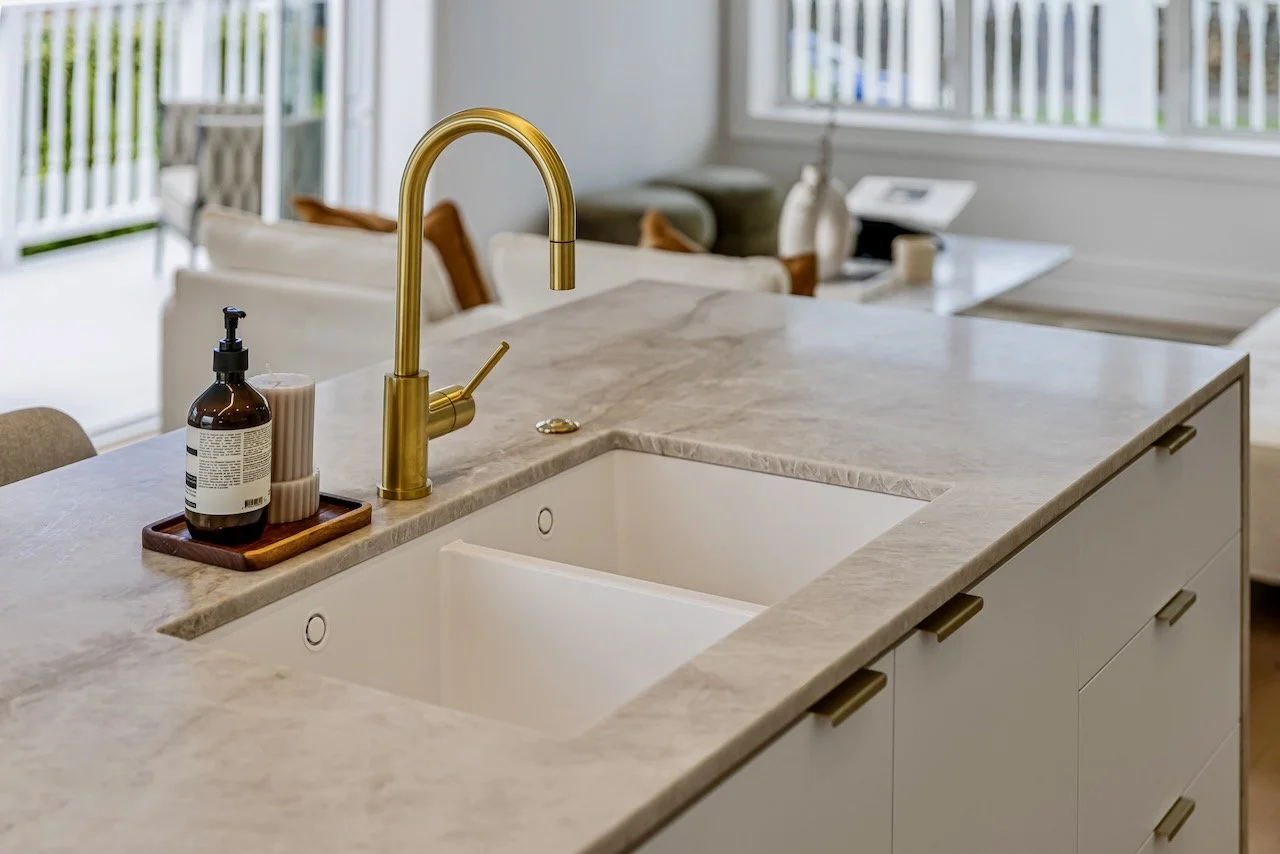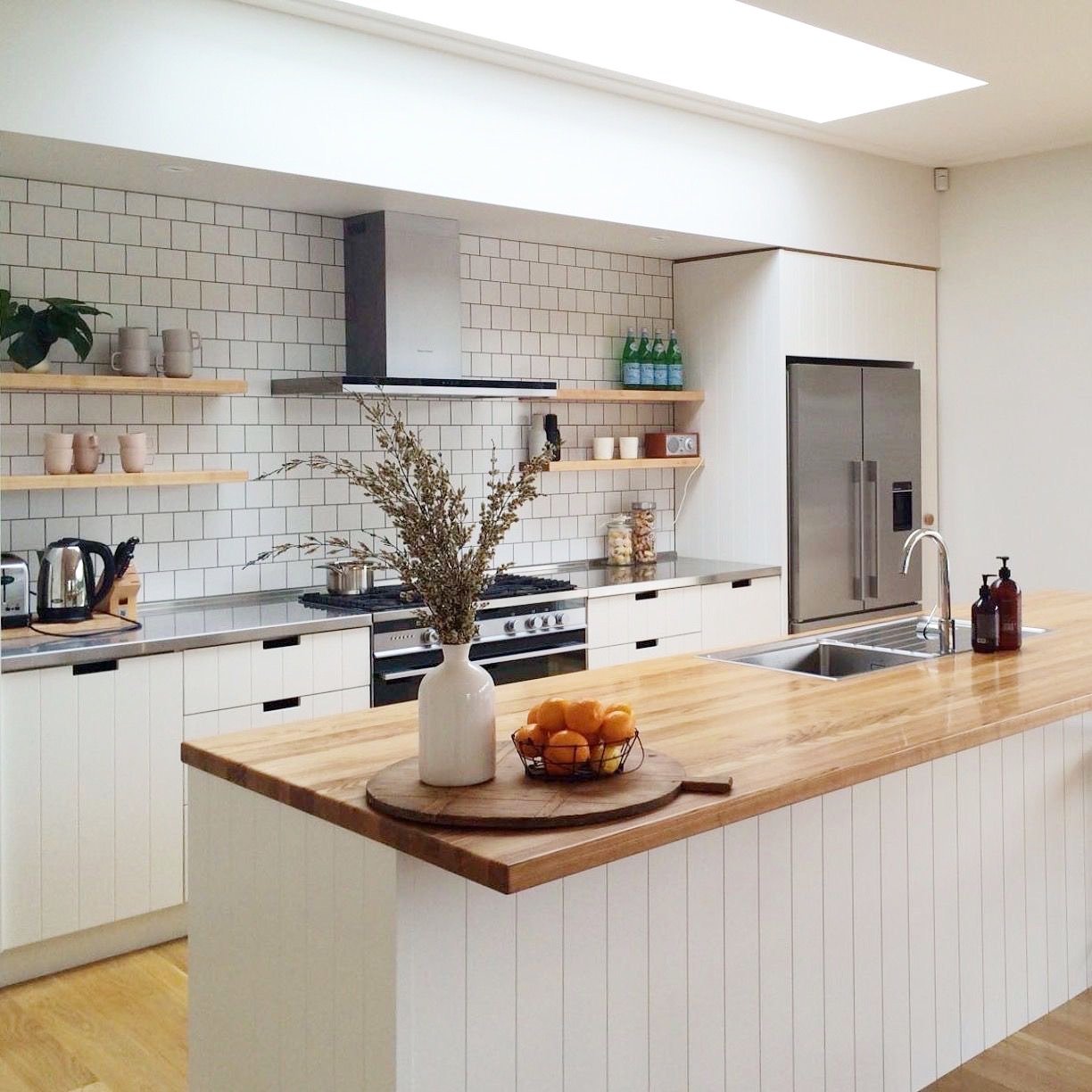A Guide To Choosing The Right Kitchen Benchtop
Kitchen featuring a granite island bench and a stainless steel bench behind.
One of the most important elements in a kitchen is the benchtop. It can make or break the appearance of your kitchen, so make your selection carefully.
This guide provides an insight into some of the different options available.
Each bench material comes with its own advantages and disadvantages. These are my favourite benchtops and ones I use most often.
Natural stone - Marble & Granite
A beautiful Carrara marble bench.
A Taj Mahal benchtop in this villa renovation in collaboration with Key Interiors.
Natural stone such as marble or granite is a luxurious and classic choice for a kitchen benchtop. It is important to note that it is not a uniform product, so there will be variations in colour and pattern from one piece to the next. This adds to the unique charm of natural stone, but it also means that it is important to select the specific slab that you like before it is installed.
Natural stones have the primary drawback of being softer and more porous than composite stones so may scratch or stain more easily. You can have your benchtop sealed if you are concerned about the durability of the stone.
Granite is a more durable natural stone and is less prone to staining than softer stones like marble and quartzite.
There’s nothing quite like the look and feel of a beautiful marble stone on an island bench. It really can be the hero of the kitchen.
Engineered (or composite) stone
An engineered stone benchtop in a concrete look finish.
Engineered stone is a man-made product that offers a similar look to natural stone, but with more consistent colour and pattern. It is made from a mix of natural quartz and other materials, which makes it extremely durable and resistant to staining and scratching. It‘s also non-porous, so it won't absorb spills and is easy to clean, however it’s not heat resistant. Engineered stone comes in a wide range of colours and patterns, so you can find the perfect match for your kitchen.
However, it's important to note that engineered stone benchtops have recently faced scrutiny due to their high silica content, which can pose health risks to fabricators during the manufacturing process. In response, some companies are phasing out high-silica products or introducing low-silica alternatives to protect workers' health. It's advisable to inquire about the manufacturing practices and silica content when considering engineered stone options.
Dekton
Dekton island bench with a stainless steel bench behind.
If you're looking for a kitchen benchtop that's both stylish and durable, Dekton may be the perfect option for you. This material is made from a unique blend of quartz, glass, and porcelain, which makes it extremely strong and resistant to scratches, stains, and heat. It's also non-porous, so it won't absorb spills or harbour bacteria. Dekton is available in a wide range of colours and finishes, so you're sure to find one that suits your taste. Some of the Dekton colours that mimic natural stone are very realistic so can be a good alternative if you love the look of marble but need a more robust benchtop. It is also perfect to use for splashbacks.
Porcelain
Porcelain is a combination of natural materials pressed and heated to very high temperatures during the firing process. This makes the surface resistant to wear, mechanical stress, and heat stress—even from the hottest pans.
Although very strong and durable, porcelain can chip on the exposed edges if not treated carefully. The pattern is only surface-level, so any chipping will reveal a plain, unpatterned surface.
Porcelain is a relatively light material that can come in slabs as thin as 6 mm thick, depending on the brand, colour, or supplier used. Porcelain is therefore perfect for wall cladding and splashbacks as well as benches. It is also ideal for outdoor use such as barbeque benches and fireplace cladding.
Wood
A solid oak island bench.
Wood is a classic choice for a kitchen benchtop. It’s warm and natural, and can be stained to match any colour scheme.
Wood is somewhat soft compared to other benchtop materials, but if necessary, it can be sanded back and refinished. It is not heat or stain resistant, so it will require more maintenance than other materials.
Wood can be finished with a resin coating to make it much more hard wearing. If finished with oil it will need to be regularly recoated to protect the wood.
Stainless steel
A practical stainless steel bench either side of the oven.
Stainless steel is a timeless and practical choice for a kitchen benchtop. It is easy to clean and maintain, and has a sleek and modern look. Stainless steel benchtops are also heat and stain resistant, making them a great choice for busy families.
We often select stainless steel for the benchtop closest to the oven as it is allows you to place hot pans directly onto the surface.
Solid Surface
Corian benchtop in Raincloud
Solid surface benchtops, such as Corian are composed of a mixture of acrylic or polyester resins and natural minerals. This combination results in a solid, non-porous surface that is highly durable and resistant to stains and impacts. Solid surface benchtops offer a seamless appearance with no visible joins, so can be formed into any length benches, curved shapes, seamless sinks and with the option of adding grooved drainage around the sink area.
Solid surface benchtops are available in a wide variety of colors and designs, from crisp white to more organic looking patterns mimicking natural stone (such as the one pictured). In the event of scratches or chips, solid surface can be easily be repaired unlike some other bench surfaces that are more difficult to fix.
Overall, the composition, combined with its durability, seamless appearance and easy maintenance makes solid surface a popular choice for both style and functionality.
Laminate
A laminate benchtop in a laundry.
Laminate has a number of benefits, the main one being the cost. It comes in a wide variety of colours and patterns and is more affordable than almost all other bench types. Other materials like real stone or wood can be imitated with the quite realistic patterns available.
Compared to some other materials, such as composites or stones, laminate is not as hard wearing. Laminate is also vulnerable to scratches and heat, so you shouldn't prepare food directly on the surface or set hot pots down on it. If your laminate countertop does get chipped, it cannot easily be fixed.
We often specify laminate benches for a secondary space, such as a laundry or scullery as this is a good way to stretch the budget. Laminate is hard wearing enough for these areas.
A beautiful marble bench.
Choose the right bench for your situation
Kitchen benchtops come in a variety of materials (this is not a comprehensive list), and each one has its own unique look and feel. No matter which material you choose, it’s important to remember that a good kitchen benchtop should be functional as well as aesthetically pleasing – so take the time to consider all your options before making a decision.
To view more completed kitchens visit our project page.
All photos in this article are kitchens designed by Suzanne Allen Design










